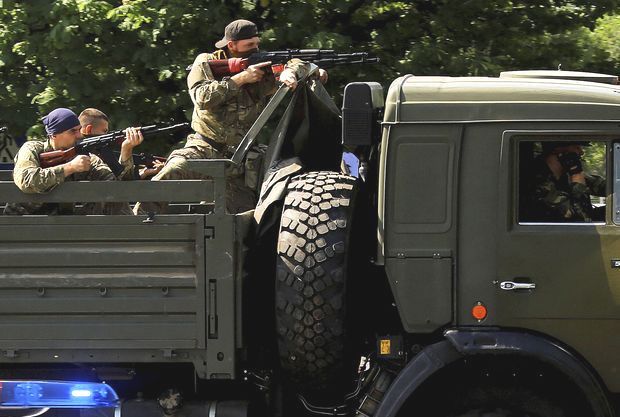Donbas and Chechen trail
Abdi NURADINOV: “Our peoples have nothing against each other, they are antagonized by politicians”
There were Russians among the wounded in the course of the anti-terrorist operation (ATO) in Donetsk, says Mayor Oleksandr Lukianchenko (http://www.ostro. org/donetsk/), adding that there are “43 victims in Donetsk hospitals, 42 men and a woman, including 8 Donetsk residents and 8 citizens of Russia, among them residents of Grozny, Gudermes (Chechnya), and Moscow.” The ATO press center simultaneously noted a large number of people from the Caucasus among the terrorists in Donetsk oblast. Ukrainski Novyny quotes Vladyslav Selezniov, head of the ATO information task force, as saying that there are “many representatives of the Caucasus among the militants.” What do Chechens have to say on the subject? The following is a telephone interview with Abdi NURADINOV, a member of the Chechen diaspora, Ph.D. (Technology), research fellow with the Ukrainian National Academy’s Physical-and-Technological Institute of Metals and Alloys.
Much is being said and written about Chechen Kadyrovites among the Russian mercenaries operating in the east of Ukraine. Any comment?
“This is the most painful issue for the Chechen Diaspora in Ukraine. It is there for all to see, of course, what with all those videos, photos, statements, newspaper articles, but there is no factual evidence. I can neither refute nor confirm the alleged Chechen presence in the east of Ukraine. If this is true, this is very bad and wrong, and even so I don’t think that they could play a key role there.
“Let’s face it. We know that Kadyrov is one of the leaders of a region that takes orders from Putin. Assuming that all that’s happening in the Donbas is organized by Putin and Yanukovych, the rest is a matter of technicalities. Had Putin asked Kadyrov to lend a hand, could the man have said no?
“The previous head of this state turned out to be a traitor, so what could one expect from representatives of foreign official or unofficial state structures that are interested in destabilizing the situation in Ukraine?”
How do you assess the relationships between our peoples?
“Our peoples have nothing against each other, they are antagonized by politicians. I have lived in Ukraine for more than twenty years. I am a citizen of this country and my children were born here. It is hard for me to picture a situation in which I’d be at odds with my colleagues or people living next door. When elephants fight, it’s the grass that suffers. In other words, politicians are our mutual problem. The east-west dividing line and the languages issue are absolutely contrived problems.”
What’s your impression of Russia’s actions on Ukrainian territory, I mean in the Donbas and Crimea?
“But for the Ukrainian administration’s weak performance in Crimea, nothing like this would’ve happened in the Donbas. It is clearly apparent that the current situation was planned abroad [i.e., by the Kremlin. – Ed.], that it is likewise being aggravated and directed. We see hundreds of armed men. Where do they come from? It is also true that they wouldn’t have been able to operate that way without having favorable conditions of sorts in Ukraine. Let’s hope that the election of the Ukrainian president in the first round will serve as a deterrent to Russian politicians and Putin.”
Do you think that the Ukrainian government should act in a more decisive manner?
“I think it should act on a stick-and-carrot basis, there is no other effective way. If it plays ball, they will become insolent; if it acts tough, there will be resistance. One also ought to consider the status of the army and intelligence agencies, the presence of agents of influence in these structures. It is necessary to consider all these factors separately and as a whole. It wouldn’t serve anyone’s good to aggravate the situation, because this could turn into a big tragedy for Europe. We all remember the anti-terrorist operation in Chechnya (where there is about a million Chechens). The Donbas has a population of some eight million, so one ought to act professionally.”
Experts note that Russia is trying to use some of the Chechnya scenario in Ukraine. Any comment?
“Russia doesn’t have to reinvent the wheel. It has accumulated enough experience. If Putin doesn’t like a country known as Ukraine, this doesn’t mean that all in Russia, including the ethnic minorities, share his dislike. The mercenaries who are fighting in Ukraine are puppets in a big geopolitical show, with the puppeteer being elsewhere. It is unfair to feature Chechen Kadyrovites in information programs and shows. Even if there are such groups there, this doesn’t mean that all ethnic Chechens want it. It is a matter of money or dependence.”
How can Russia’s information war and hysterical propaganda against Ukraine affect the relations between our peoples?
“This hysteria will pass, but there will remain the aftertaste of the annexation of Crimea and other events that are currently underway in Ukraine. Most likely, these relations will be distrustful for decades on end, although ordinary people in Russia and Ukraine bear no grudges against each other. Putin’s annexation of Crimea will only add to Russia’s problems. Most people think like consumers these days and they realize that they have received new problems with Crimea. The residents of the peninsula will not be permitted to travel abroad. Also, Russia’s federal budget will shoulder a fresh burden. We all remember that hysterical campaign under the slogan ‘Stop Feeding Caucasus!’ That’s what lies in the offing for Crimea.
“If Ukraine moves further on the road leading to European integration, if people see that this means a better, more comfortable way of life, this problem will start being resolved. Of course, much will depend on Putin who, Merkel believes, is living in another world.”






